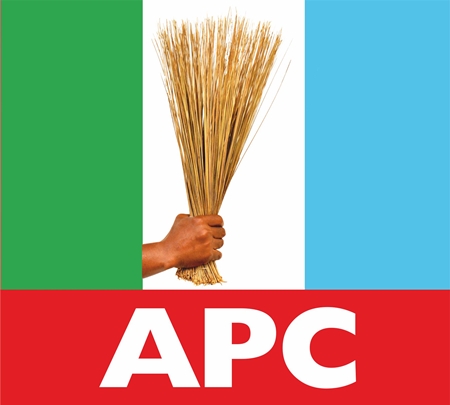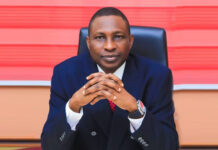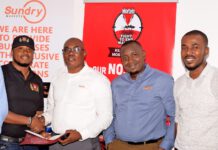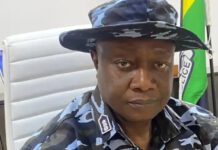
Chief John Odigie Oyegun, the national chairman of the ruling All Progressives Congress (APC), had maintained an impressive record of being punctual at the party’s national secretariat located at plot number 40 Blantyre Street, Wuse II Abuja. But soon after President Muhammadu Buhari announced the appointment of APC national leader, Asiwaju Bola Ahmed Tinubu, to lead the newly formed ‘Consultation, Reconciliation and Confidence Building Committee’, Oyegun’s punctuality which had attracted commendation from party faithful was said to have relaxed.
This, according to sources, is an indication that the party’s leadership was unhappy with the development as it considers the Tinubu panel as an indictment and manifestation of lack of confidence in the APC National Working Committee (NWC) by the presidency.
Although the National Secretary of the APC, Alhaji Maimala Buni described the appointment of Tinubu as a timely intervention by the president, analysts say the task before Asiwaju may not be a tea party considering the widening crack on the wall of the ruling party, especially ahead of the 2019 elections.
Interestingly, some pundits consider Tinubu himself as an aggrieved APC chieftain, describing his new reconciliatory role as tantamount to being a judge in his own case.
Against this background and being probably the first major assignment President Buhari has assigned to Tinubu since the 2015 general elections, his choice of leading the APC’s reconciliation committee ahead of the 2019 elections, is considered as a deliberate move by the president to secure Tinubu in his corner.
But to many analysts, the former Lagos State governor is not a stranger to mobilizing and even weathering the storm of party politics in Nigeria. He had played an unparalleled role of galvanizing support for then candidate Buhari to emerge as president under the platform of the All Progressives Congress (APC), following the merger of the defunct Congress for Progressive Change (CPC), Action Congress of Nigeria (ACN), All Nigeria Peoples Party (ANPP) and a section of Peoples Democratic Party (PDP) and All Progressives Grand Alliance (APGA).
This may have given credence to the general impression that Buhari would not have scaled through in 2015, if Tinubu had not collapsed his electoral fortune in the South West and his goodwill in other geo-political zones into the APC trail.
But many waters have passed under the bridge since Buhari’s emergence. At a time it was alleged that Tinubu had parted ways with Buhari on the grounds that he was not effectively ‘carried along’ during cabinet formation and other appointments even as his business empire and those of his close associate were allegedly grossly “undermined” under the watch of the very government he laboured to put in place.
Herculean task
Not a few observers consider the responsibility given to Tinubu.
While some believe that despite the fact that the ‘embargos’ placed on several of Tinubu’s interests have been relaxed of recent, he still has many reservations, even as most of the people he is asked to bring on board are believed to have their concerns over his selection.
It was gathered that the ‘blank cheque of freedom’ given to Tinubu to select members of his committee was also deliberate- to give him clear impression that he is trusted.
The announcement of his appointment by Buhari’s spokesman was silent on other committee members but when asked if the names would be released soon, he said: “Of course, he (Tinubu) cannot work alone. He will put the team together. When the time comes, he will assemble a team that will work with him.”
The APC as a party is deeply factionalized with many pundits expressing doubts as to whether it would withstand pressure from within and without ahead of next year’s general elections.
“With former heads of state including Olusegun Obasanjo and Ibrahim Babangida already waging war against Buhari; coupled with pressure from many serving and former governors that have pending cases of corruption and other misdemeanours against them; Buhari cannot afford to allow Tinubu to join the bandwagon of the opposition. This is basically why he gave him this complicated assignment,” a chieftain of APC said.
The source who wouldn’t want to be named said Tinubu remains the biggest and most formidable force that might likely make headway in reconciliation.
Another source said Tinubu was chosen because he controls a big empire in the APC both at the national and regional level and President Muhammadu Buhari would not find it easy in the event the former Lagos governor revolts.
‘What Tinubu must do to succeed’
For Tinubu to succeed, those in the know said his first port of call should be the presidency where he should convince President Buhari to become a party man.
Another source said if anything, Buhari is the chief architect of the crisis in the APC because according to him, he does not treat it as a golden child; hence the apparent inactivity in the party with attendant acrimony, inconsistency about policy direction and poor financing.
Another port of call is the National Assembly, considered to be the root of the party’s woes. It is widely believed that the crises that enveloped the APC emanated from the National Assembly before spreading to states and even local government areas.
Similarly, the National Assembly also hosts all the key political gladiators including the Senate President, Bukola Saraki, Speaker of the House of Representatives, Yakubu Dogara, Senator Rabiu Musa Kwankwaso, Senator Shehu Sani and many others.
The foundation of the APC’s crisis was believed to have been laid when Saraki and Dogara defied the party’s directive to emerge as Senate President and Speaker, respectively, in June 2015, when the National Assembly was inaugurated.
It was after the emergence of Saraki and Dogara that other crises in the party became pronounced at many levels.
Hurdles before Tinubu
A senator from the North West said there are no fewer than four camps in the APC at present, describing the task before Tinubu as “daunting.”
“We have four camps namely the National Assembly camp (including some disenchanted ex-governors), the Amaechi/ El-Rufai camp, the Tinubu camp and the Buhari camp. It is not possible for the power forces to come together before 2019,” he said.
He said Saraki, being the Senate President leads the National Assembly camp of the APC and that any reconciliation without carrying him along will not yield the desired result.
Weeks ago, the senators supported ex- Governor Rabiu Musa Kwankwaso against Kano State Governor Abdullahi Ganduje when they asked the Inspector General of Police, Ibrahim Idris, to provide security for Kwankwaso to visit Kano.
This development showed that the lawmakers are working together in fighting all perceived enemies. For now, there are ample pointers that Ganduje is in the good books of Buhari.
Another senator said Tinubu will not succeed in resolving the crises “because he is part of the problems.”
“Take it or leave it, Tinubu has grudges against the President and he is still nursing them. Assigning such responsibility to Tinubu is like submitting yourself to the lion’s den,” he said.
Tinubu’s task in reconciling the grievances of some APC members in the House of Representatives will also be very difficult as some of the lawmakers have alleged that the former Lagos State governor also has scores to settle with some of them.
This much reared its head on the floor of the House last Thursday, when a member of the party from Kwara State, Rep Aliyu Hamman-Pategi, spoke while contributing to the debate on a motion about how the Nigerian legal system is being manipulated by the Attorney General of the Federation (AGF) and Minister of Justice Abubakar Malami.
Hamman-Pategi, a staunch Saraki loyalist, questioned the sincerity of the reconciliation move, saying President Buhari has been angry with some of them since the contest that led to the emergence of the presiding officers of the National Assembly on June 9, 2015.
He said the president called them to a dinner where he expressed anger that APC members allowed PDP into his government by the emergence of Sen. Ike Ekweremadu as Deputy Senate President, saying he feels that is part of the problem.
Wondering how Tinubu can sit side-by-side with Saraki to resolve differences when the former appears to be part of the problem, Pategi said: “I feel that the EFCC and Code of Conduct Tribunal are political tools used by this administration to victimize those that they feel are not with them,” he said.
From the contributions of most APC lawmakers to the debate on the motion that day, it seems there may be an implosion in the party soon, as no lawmaker opposed the motion, which appeared to be a tacit support for Saraki who is undergoing retrial over corruption allegations at the CCT.
A lawmaker told Daily Trust on Sunday that Tinubu’s assignment actually came at the 11th hour and that the president must come out himself to spearhead some of the reconciliations.
“He (Buhari) can’t be shying away now. If really the party wants to approach the elections as a united house, then Mr President must come in. Even if he’s not contesting, he should be able to make the party united to face the polls because he’s our leader,” he said.
Another APC lawmaker from the North West, who also has problems with his state governor, told Daily Trust on Sunday that the reconciliation should not be limited to the likes of Saraki and Kwankwaso alone.
The lawmaker also said that the reconciliatory mechanism put together by the president should be sustained even after elections.
Fighting among Buhari support groups
Another area Tinubu would have to work on is the coordination of various Buhari support groups that are being sponsored by some key loyalists of President Buhari.
One of such is the Coalition of APC Support Groups (CASG) being led by Ambassador Lawal Mohammed Munir.
This group, with another called Coalition of Buhari Support Organisations (CBSOs) are believed to be enjoying the support of Comptroller General of the Nigeria Customs Service (NCS), Col. Hameed Ibrahim Ali.
The group, last year openly opposed another support group known as the National Committee for Buhari Support Groups (NCBSG) led by another key ally of President Buhari, Senator Abu Ibrahim who represents Katsina South Senatorial District.
The two groups mentioned earlier had accused the Abu Ibrahim led bloc of supporters of trying to hijack their organisations.
But Senator Ibrahim who is also the Chairman, Senate Committee on Police Affairs, replied that he was only trying to bring together the over 198 groups that worked for Buhari before the 2015 elections out of which about 23 had national spread.
He said that other groups condemning or blackmailing them are affiliated with the All Progressives Congress (APC) while they are not.
He explained that he was able to convince the President who agreed that the support groups should be centrally coordinated for effectiveness to ease their operations for the 2019 elections.
Pundits said the Tinubu committee would also need to look at personality clashes of the leaders of this support groups as some might be used against the party and the President during electioneering.
The National Chairman of Action Democratic Party (ADP), Alhaji Yabagi Sani, said the appointment of Tinubu would not address crisis within the APC.
“Tinubu cannot be a judge in his own case. Besides, he is the bone of contention in all the crises in the APC; Nigerians should stop lamenting and join the ADP,” he said.
Sani maintained that the crisis within APC is in its foundation and should be tackled from there.
But the Lagos chapter of the APC has hailed the nomination of Tinubu to lead the task of reconciling aggrieved members of the party.
In a statement signed by the APC Publicity Secretary in Lagos State, Joe Igbokwe, the party hailed Tinubu’s appointment, even as it pleaded with all aggrieved persons to work with him.
“We know our leader very well, we know what he is capable of doing; we know his deep background and we know he will not fail in this herculean task even at a time like this.
“Make no mistake about it; a lot of work needs to be done knowing Nigeria’s diverse nature, culture, religion, tribe or tongue, but we have no doubt that Asiwaju will not disappoint Nigerians,” the statement said.
Stay updated with the latest Nigerian news from Information Nigeria




